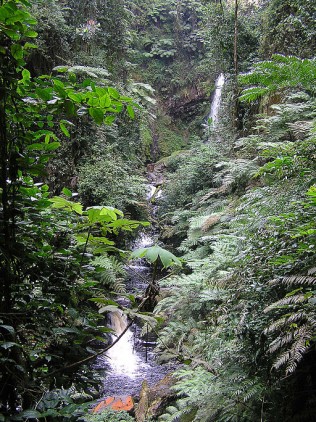As a nation still haunted by the memories of genocide, Rwanda continues to show its ability to be redeemed. Their efforts to preserve the natural beauty of mountain rain forests like with Nyungwe National Park continues to be a goal among government officials. The effect is twofold: travelers from abroad get to witness the beautification of the Nyungwe while the atmosphere of surrounding communities is maintained by tourist funds.
Nyungwe was established as a national park in 2005 and is currently regarded as one of Africa’s rarest rain forests because of its size and variation of wildlife. It’s the third national park in Rwanda after Volcano and Akagera National Parks and was specifically designed to protect and cultivate parts of the nation as a biodiversity hot spot and tourist destination.
Nyungwe hosts hundreds of species, including a distinguishable community of chimpanzees that are the main attraction for visitors. Other featured animals include Ruwenzori turaco and mountain gorillas. Bird popularity is expected to be on the rise as things continue to progress and the habitat expands.
In addition, government officials have invested in a wide range of initiatives that help increase awareness about the National Park among natives and travelers.
“We have built necessary infrastructure, including the communications in and around the park, administrative facilities, and rangers’ posts,” says Park Services Coordinator, Louis Rugyerinyange. “We’re also in the process of establishing the community conservation program where we’re building relationships with the neighboring people and supporting community project through tourism revenue-sharing. We’ve developed nature-based tourism initiatives like forest camping and forest trails, and we’ll be introducing the public/private partnership through concessions in managing commercial interests in the park, such as accommodation, food, and beverage stores.”
On average, Nyungwe receives about 8,500 visitors annually and 80% are international guests. Visitors from all walks of life can appreciate the park’s allure and the wide array of activities that make the rain forest a favored attraction. Here’s answers to frequent travel questions that make preparing for this immeasurable experience much easier.
When’s the Best Time to Go?
Active travelers who want to stay dry during their trip are encouraged to go in the summer or early fall. July through October bring drier months with better opportunities for hiking, tea plantation tours, and lengthy safaris that enable tourists to view the site’s community of gorillas and chimpanzees.
Any Suggestions on Food, Lodging and Good Buys?
Nyungwe is filled with eclectic foods that appeal to a wide range of guests. The Kitabi Cultural Village, for instance, provides samples of its conventional milk, banana beer, and special tea leaves. There’s also several lodges that are great spots to call home during the stay in the rain forest. Amenities include private balconies, pleasing scenery, and full views of the national park and nearby bodies of water. Regarding gifts, it’s a good idea to check out the indigenous crafts shops in the area that feature an assortment of collectibles that range from hand-carved wood items and baskets to beautifully designed jewelry.
What Tips are Most Helpful?
Rwandan rain forests remain highly vulnerable and are under the protection of numerous environmental enforcements that tourists should remain mindful of for conservation purposes. Plastic bags are banned, walking on the grass is prohibited, and littering is considered a crime punishable by law.
So, what’s next for Nyungwe?
According to Rugyerinyange, visitors can expect projects to come into fruition over the next few years.
“Nyungqwe has potential to serve as a prominent resource laboratory for applying excellence in natural science to understand and respond to environmental changes,” he says. “Additionally, Nyungwe ecosystem services, including water and carbon sequestration have potential to generate large amounts of revenues for the park.”
Read Ethical Traveler's Reprint Policy.

